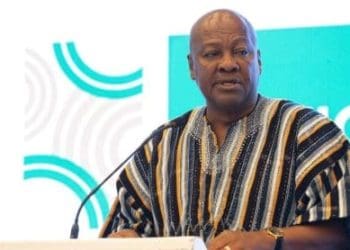A fresh legal storm has erupted in Ghana’s immigration and naturalisation landscape as lawyer Kofi Asmah, counsel for Indian businessman Mr. Amar Deep Singh Hari, has formally petitioned Interior Minister Mubarak Muntaka to revoke Ghanaian citizenship granted to two Indian nationals — Ms. Niharika Handa and her son, Mr. Punar Vasu Handa.
In a petition dated September 19, 2025, and received at the Ministry of the Interior on September 23, 2025, lawyer Asmah cited constitutional and statutory provisions to back his demand.
He alleged that the citizenships of the Handas were procured through fraud, misrepresentation, and concealment of material facts, which render them invalid and liable to revocation.
Legal grounds for the petition
The petition draws on Article 9(3) of the 1992 Constitution, which provides that the High Court, upon application by the Attorney General, may deprive a person of citizenship not acquired by birth if it was obtained through fraud, misrepresentation, or any other improper practice.
Lawyer Asmah also invoked Section 18(b) of the Citizenship Act, 2000 (Act 591), which mirrors this constitutional threshold, and Section 22 of the same Act, which criminalises false statements made for the purpose of obtaining benefits under the Act, including naturalisation.
To reinforce his arguments, Asmah referenced two landmark Supreme Court cases.
In Republic v. High Court, Accra; Ex parte Dada Awiah (2021) GHASC 9, the apex court reaffirmed that fraudulent acts vitiate even the most sacred of legal rights, including citizenship.
He also cited Republic v. Mensah Bonsu, Ex parte Attorney General (1995–96) 1 GLR 377, which established that administrative discretion must always be exercised in strict compliance with statutory and constitutional provisions, particularly when the integrity of the Republic is at stake.
Allegations against Ms. Niharika Handa
Central to the petition are allegations of deliberate identity fraud by Ms. Niharika Handa.
According to Asmah, Ms. Handa presented conflicting birth dates across multiple jurisdictions and documents.
Her Indian passport, Ghanaian passport, and Ghana Card issued in July 2022 record her date of birth as September 14, 1961. However, her Indian PAN Card and driver’s licence record September 14, 1965, while another Indian record lists September 14, 1964.
The petition contends that she selectively used these conflicting identities across continents.
For instance, she allegedly used the 1965 birth date across corporate records in the United Kingdom and Australia, as well as in visa applications for the UK, Schengen countries, and the UAE.
Company filings in Ghana were also retrospectively amended to reflect this date, suggesting a systematic attempt to propagate a false identity.
Beyond discrepancies in personal data, the petition accused Ms. Handa of concealing 14 active non-bailable arrest warrants pending against her in India at the time of her application for Ghanaian citizenship.
According to Asmah, this omission violated the requirement of “good character” under Ghana’s naturalisation framework.
Allegations against Mr. Punar Vasu Handa
The petition extended similar allegations to Ms. Handa’s son, Mr. Punar Vasu Handa. While his Ghanaian passport lists his date of birth as December 7, 1985, his Indian PAN Card records February 7, 1985. ‘
In 2025, Punar allegedly declared his Ghanaian passport lost and subsequently obtained a new one reflecting the altered December date of birth.
According to the petition by Asmah, Punar Handa is still subject to ongoing legal proceedings in India under Sections 138 and 141 of the Indian Negotiable Instruments Act.
Instead of complying with these summonses, he allegedly relies on his Ghanaian citizenship as a shield against accountability.
Fraudulent misrepresentation and national security risks
Lawyer Asmah argued that the use of multiple dates of birth constitutes fraudulent misrepresentation.
He described date of birth as a critical biometric identifier used in criminal background checks, immigration due diligence, and anti-money laundering and “know-your-customer” protocols.
By manipulating this data, the respondents allegedly obscured adverse records and evaded enforcement across jurisdictions.
He dismissed any suggestion that such discrepancies could be clerical errors, noting that the false identities were consistently repeated and used in legal, corporate, and international contexts without any corrective measures.
“The discrepancies threaten the very foundations of Ghana’s national identity,” Asmah warned.
He insisted that Ghana cannot remain passive in the face of such alleged deception, as doing so would constitute a betrayal of constitutional obligations to protect the integrity of citizenship.
Requested actions from the minister
In his petition, Asmah asked Interior Minister Mubarak Muntaka to carefully review the Handa matter and refer it to the Attorney General for action under Article 9(3) of the Constitution and Section 18(b) of Act 591.
He also urged the minister to preserve and secure all citizenship-related records of the respondents pending final determination, and to refer them to law enforcement agencies for investigation under Section 22 of Act 591 and other applicable laws.
Citizenship and the sanctity of the Republic
According to Asmah, the petition is not motivated by private interests alone but by the need to safeguard the constitutional sanctity of Ghanaian citizenship.
He argued that naturalisation is a privilege, not an absolute right, and where deception has tainted the process, the state must respond firmly, lawfully, and transparently.
“The Republic must act to protect the value of its citizenship, for if fraud and misrepresentation are permitted to stand, the integrity of our national identity itself will be undermined,” he concluded.












